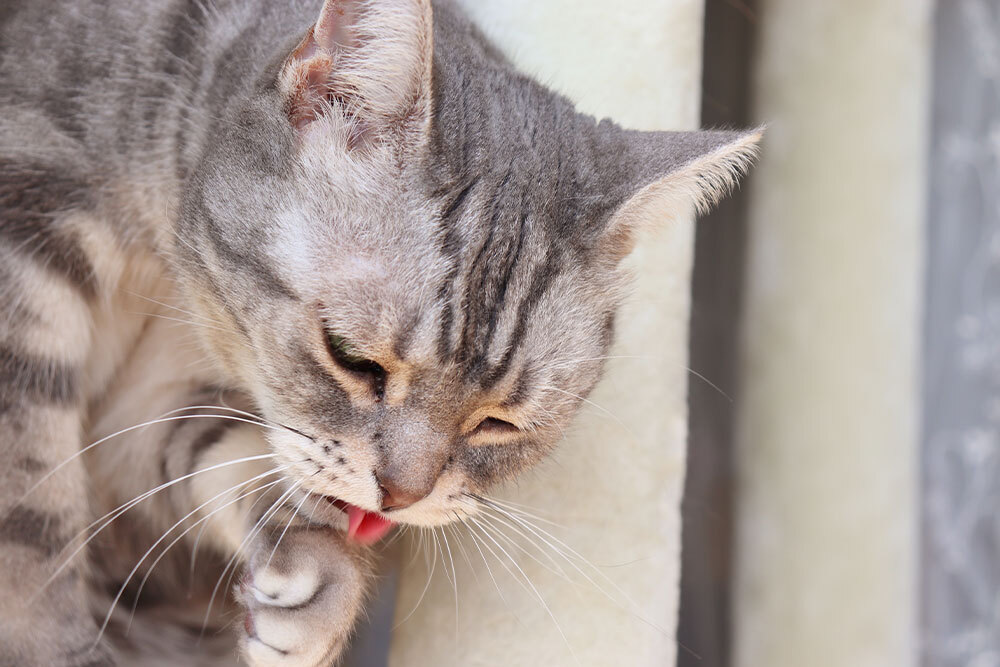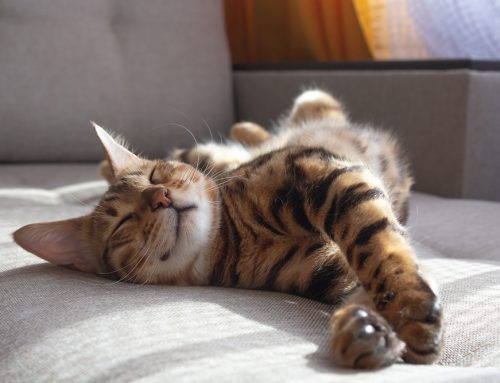At Stack Veterinary Hospital in Syracuse, NY, we know how unsettling it is to see your cat vomit—whether it’s a rare occurrence or a recurring concern. Vomiting can be messy, confusing, and emotionally stressful. Most importantly, it can sometimes be a signal that something more serious is going on beneath the surface.
In this guide, we’ll help you understand the difference between occasional, manageable vomiting and the kind of patterns that require a closer look. We’re here to give you peace of mind and a clear path forward.
What Is Vomiting in Cats?
Vomiting is the active expulsion of stomach contents, often preceded by warning signs like drooling, gagging, or visible abdominal contractions. This is different from regurgitation, which is more passive and involves undigested food coming up from the esophagus.
Occasional vomiting—such as from hairballs or eating too quickly—can be normal. But if your cat vomits frequently, persistently, or in combination with other symptoms, it’s time to dig deeper.
Learn more from Cornell Feline Health Center
Common Causes of Vomiting in Cats
Cats vomit for a wide variety of reasons, ranging from minor dietary mishaps to chronic illness. Some of the most frequent causes include:
Hairballs
Shedding season and frequent grooming can lead to hair accumulating in the stomach. While the occasional hairball is typical, excessive vomiting may indicate overgrooming, stress, or GI motility issues.
Dietary Issues
- Eating too fast (“scarf and barf”)
- Spoiled or fatty food, table scraps
- Sudden diet changes (which can disrupt the gut)
For safe feeding practices, visit the CDC’s guide on pet food safety.
Food Allergies or Intolerances
If your cat consistently vomits after eating, it could be due to sensitivities to ingredients like chicken, fish, or grains.
Parasites
Worms and other intestinal parasites are common causes of vomiting, particularly in young or outdoor cats.
Toxins
Household cleaners, certain plants, human medications, and even essential oils can be toxic. See this ASPCA list of toxic and non-toxic plants.
Underlying Medical Conditions
Vomiting can be a symptom of:
- Chronic Kidney Disease
(More from Cornell) - Hyperthyroidism
(AAHA’s hyperthyroidism guidelines) - Pancreatitis
(Understanding Pancreatitis in Pets – AAHA) - Inflammatory Bowel Disease (IBD)
- Liver disease (Hepatic Lipidosis)
(Learn more about hepatic lipidosis from Cornell)
Foreign Body Ingestion
If your cat swallows a string, toy, or other non-digestible object, it can block the intestines and cause vomiting. This may require surgical intervention.
Learn more from ACVS
Why Vomiting Matters
Vomiting isn’t just an inconvenience—it can lead to:
- Dehydration
- Electrolyte imbalance
- Esophagitis (inflammation of the esophagus)
- Aspiration pneumonia (from inhaling vomit)
- Malnutrition or weight loss
When vomiting becomes chronic, it can mask or worsen other conditions, making early detection critical.
When to Worry: Symptoms to Watch For
Certain red flags suggest your cat’s vomiting may be more serious:
- Vomiting more than once or twice a week
- Presence of blood, foam, or bile in vomit
(Guide to vomit appearance – Purina) - Lethargy or hiding behavior
(Lethargy in cats – Cat Friendly) - Loss of appetite or sudden weight changes
- Diarrhea, abdominal pain, or constipation
- Dehydration (dry gums, sunken eyes, or skin tenting)
If your cat experiences any of these, don’t wait—schedule a veterinary visit promptly.
What to Expect at Your Vet Appointment
At Stack Veterinary Hospital, we take a comprehensive approach to diagnose the root cause of vomiting:
- Complete physical exam
- Bloodwork to assess organ function
- Urinalysis to check hydration and infection status
- X-rays or ultrasound to evaluate for obstructions or tumors
- Endoscopy for direct visualization of the GI tract
- Specialized testing for thyroid disease, pancreatitis, or infections
We also consider your cat’s lifestyle, environment, and diet when forming a diagnostic plan.
Treatment: What Are the Options?
Supportive Care
- IV or subcutaneous fluids to prevent dehydration
- Anti-nausea and anti-vomiting medication
- Appetite stimulants if needed
Dietary Management
Switching to a hypoallergenic, novel protein, or prescription gastrointestinal diet can ease symptoms. We partner with Hills to Home for easy, home delivery of therapeutic diets.
Medication
Depending on the cause, treatment may include:
- Dewormers or anti-parasitic medications
- Antibiotics for bacterial infection
- Anti-inflammatories for IBD
Surgery
Foreign bodies or tumors may require exploratory surgery.
Learn about surgical procedures
Caring for a Vomiting Cat at Home
Vomiting affects both your cat’s wellbeing and your household. Managing the mess, tracking symptoms, and giving medications can be emotionally taxing.
A few at-home strategies can ease daily life:
- Provide small, frequent meals
- Keep your cat’s environment calm and enriched
- Brush regularly to reduce hairballs
- Use slow feeders or puzzle bowls to prevent overeating
Prevention Tips
While not all causes of vomiting are preventable, these steps help:
- Introduce new foods gradually
- Keep string, thread, and small toys out of reach
- Use elevated feeding bowls for easier digestion
- Choose high-quality, easily digestible food
- Create a routine of regular vet checkups and parasite control
Unusual Causes Worth Considering
While less common, some vomiting cases stem from:
- Neurological conditions that affect the vomiting center in the brain
- Motion sickness during travel
- Psychological stress, which can trigger vomiting in sensitive cats
If standard causes are ruled out, we’ll work with you to explore more nuanced diagnoses.
Preparing for Your Visit
To help us help your cat, please bring:
- A log of vomiting episodes (time, content, triggers)
- A sample of the vomit, if safely collected
- A list of all medications, supplements, and foods
- Photos or videos of symptoms, especially if intermittent
Helpful Questions to Ask:
- What’s the most likely cause of vomiting in my cat?
- Which diagnostics do you recommend?
- What’s the expected recovery timeline?
- How can I monitor my cat at home?

FAQs
Is it normal for my cat to vomit hairballs?
Not Really. Hairballs may indicate overgrooming, allergies, or motility issues.
Can stress or anxiety cause vomiting?
Yes. Environmental changes, new pets, or even loud noises can trigger GI symptoms.
When is vomiting an emergency?
If your cat can’t keep water down, is extremely lethargic, or vomits blood—seek immediate veterinary attention.
Your Partner in Cat Health
At Stack Veterinary Hospital, we’re more than just providers—we’re your trusted partners in lifelong pet care. If you’re concerned about your cat’s vomiting, don’t hesitate to contact us or explore our specialty services for additional diagnostic and treatment support.
Your cat’s comfort, safety, and health are our top priorities—and we’re here to help you every step of the way.







Leave A Comment